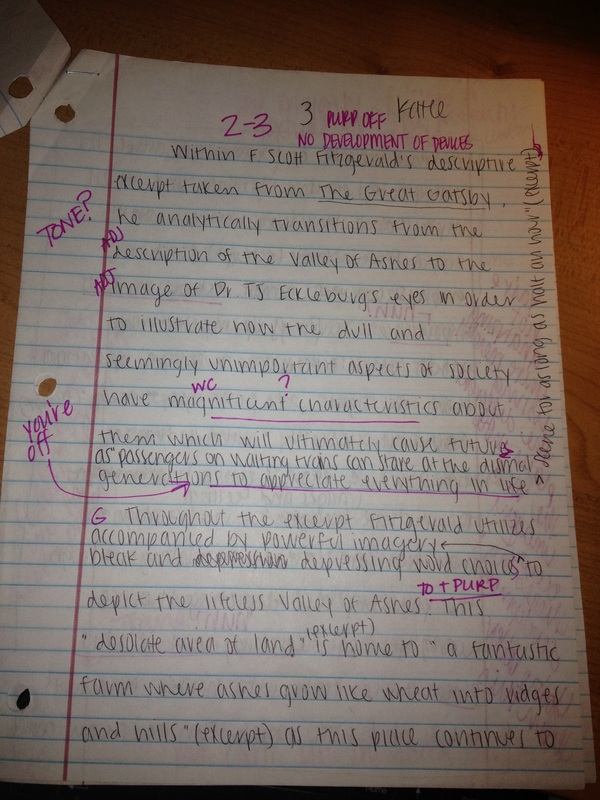
Here are a few revising and editing tips for your rhetorical analysis essay.
1) Verb tense
When you are writing about nonfiction events, keeping verb tenses consistent can be confusing.
– Use literary present when discussing what the author has done ('Will writes…' and 'Will convinces his audience by…')
Since mid-2015, Donald Trump has shaken the political arena with an unprecedented yet effective public rhetorical repertoire. Regardless of alleged scandals, frequent social media usage, and extemporaneous and fiery rally speeches, the president's approval ratings remain steady and he continues to move forward in his international and local political endeavors. Our first analysis considers the most frequent lemmas occurring in the oral interventions of the candidates during the TV debates of the primaries. Unsurprisingly, the article ‘the' and the verb ‘be' (lemma of the word types am, is, are, was, etc.) appear regularly in the first two ranks.
– Use past tense when discussing events that occurred in the past ('Krakauer painstakingly describes the strange condition that affected his cat in 1987.')
2) Names that end in s
Many people have articles by Leonard Pitts Jr. The possessive of Pitts is Pitts's, not Pitts'. The only time you put an apostrophe at the end of a word to make a possessive is if the word already has two 's' sounds. So Texas', for example.
3) Titles
Titles of articles go in quotation marks. Titles of publications go in italics.
Rhetorical Analysis Verbs
4) Punctuation with quotation marks
Unless you are dividing a quotation from internal documentation at the end of a sentence OR adding a question mark or exclamation point where there was none, punctuation belongs inside quotation marks:
Mrs. Laffin is tired, but she can't stop reading 'The Solitary Way.'
Mrs. Laffin is reading 'The Solitary Way,' which is a fascinating article.
Have you read 'The Solitary Way'?

Rhetorical Analysis Outline Worksheet

5) Comma faults and run ons
I am seeing many of these. I am going to take more points off for these since this is a major error that should be fixed during revising and editing.
ALL of these examples are either a comma fault or run on.
The article is good, however she should go to sleep.
The article is good however she should go to sleep.
The article is good, however, she should go to sleep.
CORRECT: The article is good; however, she should go to sleep.
The ONLY words you can use to join two sentences with only a comma are the FANBOYS: for, and, nor, but, or, yet, and so. Most other words y'all are using with commas actually need a semicolon, the word, and then a comma (like with however above).
6) Connecting device to purpose
A reminder: this is a task you have done many times throughout your high school career. You are used to identifying the theme of a piece of literature, but here you are identifying the purpose of a piece of rhetoric… But those are very similar. You are also used to connecting literary devices to the development of theme. For this task, you are connecting rhetorical devices to the development of purpose. All of the principles are the same, you just have purpose instead of theme, and devices instead of… oh, wait, those are really similar : ) The only 'extra' are ethos, pathos, and logos, and y'all should have those down pat.
ORDER OF THE PAPER
Right side of folder: Final draft + works cited **
** Due by 5:00 Friday for early points; due by 5:00 Monday for regular points
Left side of folder, listed from TOP of pile to BOTTOM of pile:
Annotated article
Notes/planning/outlining/prewriting
First draft
Additional drafts**
Peer editing sheets
** I see on the rubric that I specified at least two thoroughly marked drafts for exemplary. I did discuss having one in class today, but according to the rubric, if you have one you will get 12 instead of 17 or 20 points. Please plan to follow the rubric.
You are awesome!!

- < Previous Event
Home > OSR > Spring Student Showcase for Research and Creative Inquiry > 2020 > HONORSCOLLEGE > 3
Cormier Honors College for Citizen Scholars
Event Title
Presenter Information
Project Category
Cormier Honors College for Citizen Scholars

Here are a few revising and editing tips for your rhetorical analysis essay.
1) Verb tense
When you are writing about nonfiction events, keeping verb tenses consistent can be confusing.
– Use literary present when discussing what the author has done ('Will writes…' and 'Will convinces his audience by…')
Since mid-2015, Donald Trump has shaken the political arena with an unprecedented yet effective public rhetorical repertoire. Regardless of alleged scandals, frequent social media usage, and extemporaneous and fiery rally speeches, the president's approval ratings remain steady and he continues to move forward in his international and local political endeavors. Our first analysis considers the most frequent lemmas occurring in the oral interventions of the candidates during the TV debates of the primaries. Unsurprisingly, the article ‘the' and the verb ‘be' (lemma of the word types am, is, are, was, etc.) appear regularly in the first two ranks.
– Use past tense when discussing events that occurred in the past ('Krakauer painstakingly describes the strange condition that affected his cat in 1987.')
2) Names that end in s
Many people have articles by Leonard Pitts Jr. The possessive of Pitts is Pitts's, not Pitts'. The only time you put an apostrophe at the end of a word to make a possessive is if the word already has two 's' sounds. So Texas', for example.
3) Titles
Titles of articles go in quotation marks. Titles of publications go in italics.
Rhetorical Analysis Verbs
4) Punctuation with quotation marks
Unless you are dividing a quotation from internal documentation at the end of a sentence OR adding a question mark or exclamation point where there was none, punctuation belongs inside quotation marks:
Mrs. Laffin is tired, but she can't stop reading 'The Solitary Way.'
Mrs. Laffin is reading 'The Solitary Way,' which is a fascinating article.
Have you read 'The Solitary Way'?
Rhetorical Analysis Outline Worksheet
5) Comma faults and run ons
I am seeing many of these. I am going to take more points off for these since this is a major error that should be fixed during revising and editing.
ALL of these examples are either a comma fault or run on.
The article is good, however she should go to sleep.
The article is good however she should go to sleep.
The article is good, however, she should go to sleep.
CORRECT: The article is good; however, she should go to sleep.
The ONLY words you can use to join two sentences with only a comma are the FANBOYS: for, and, nor, but, or, yet, and so. Most other words y'all are using with commas actually need a semicolon, the word, and then a comma (like with however above).
6) Connecting device to purpose
A reminder: this is a task you have done many times throughout your high school career. You are used to identifying the theme of a piece of literature, but here you are identifying the purpose of a piece of rhetoric… But those are very similar. You are also used to connecting literary devices to the development of theme. For this task, you are connecting rhetorical devices to the development of purpose. All of the principles are the same, you just have purpose instead of theme, and devices instead of… oh, wait, those are really similar : ) The only 'extra' are ethos, pathos, and logos, and y'all should have those down pat.
ORDER OF THE PAPER
Right side of folder: Final draft + works cited **
** Due by 5:00 Friday for early points; due by 5:00 Monday for regular points
Left side of folder, listed from TOP of pile to BOTTOM of pile:
Annotated article
Notes/planning/outlining/prewriting
First draft
Additional drafts**
Peer editing sheets
** I see on the rubric that I specified at least two thoroughly marked drafts for exemplary. I did discuss having one in class today, but according to the rubric, if you have one you will get 12 instead of 17 or 20 points. Please plan to follow the rubric.
You are awesome!!
- < Previous Event
Home > OSR > Spring Student Showcase for Research and Creative Inquiry > 2020 > HONORSCOLLEGE > 3
Cormier Honors College for Citizen Scholars
Event Title
Presenter Information
Project Category
Cormier Honors College for Citizen Scholars
Presentation Type
Presentation
Verbs For Literary Analysis
Description
Data Analysis Verbs
On the night of January 28, 1985, the charity single song, 'We Are The World,' written by Michael Jackson and Lionel Richie, was produced in A&M Studios in Los Angeles. At the recording studio, there was a sign that said, 'Check your egos at the door,' which acted as a visual reminder for why these artists were there. This idea was put in place by producer Quincy Jones, who knew he had one night to bring over 40 of the country's biggest stars together for a cause much bigger than themselves. A rhetorical analysis of 'We Are The World' reveals the effectiveness of using Aristotle's three rhetorical appeals: ethos, pathos, and logos to persuade listeners that global issues are personal issues that everyone should be inclined to respond to. Using the credibility (ethos) of popular recording artists was more likely to make a wider audience willing to listen to the true meaning of 'We Are The World'. The words used in the song lyrics were specifically chosen to elicit an emotional response (pathos), serving most literally as a call to action. 'We Are The World' proved to have an overwhelming effect on the audience, evident in the data from records sold and money raised. Although the song included a few logical fallacies, 'We Are The World,' still carries significant integrity from the mass of artists coming together to promote a much greater cause, providing a potential rhetorical framework for contemporary global causes--such as the COVID-19 relief efforts today.
Included in
Other English Language and Literature Commons, Other Rhetoric and Composition Commons, Rhetoric Commons
COinSENGL 400: A Rhetorical Analysis of the Song, 'We Are The World': A Call to Change -- Yesterday, Today, and Tomorrow (And a Potential Rhetorical Framework for COVID-19 Relief Efforts)
On the night of January 28, 1985, the charity single song, 'We Are The World,' written by Michael Jackson and Lionel Richie, was produced in A&M Studios in Los Angeles. At the recording studio, there was a sign that said, 'Check your egos at the door,' which acted as a visual reminder for why these artists were there. This idea was put in place by producer Quincy Jones, who knew he had one night to bring over 40 of the country's biggest stars together for a cause much bigger than themselves. A rhetorical analysis of 'We Are The World' reveals the effectiveness of using Aristotle's three rhetorical appeals: ethos, pathos, and logos to persuade listeners that global issues are personal issues that everyone should be inclined to respond to. Using the credibility (ethos) of popular recording artists was more likely to make a wider audience willing to listen to the true meaning of 'We Are The World'. The words used in the song lyrics were specifically chosen to elicit an emotional response (pathos), serving most literally as a call to action. 'We Are The World' proved to have an overwhelming effect on the audience, evident in the data from records sold and money raised. Although the song included a few logical fallacies, 'We Are The World,' still carries significant integrity from the mass of artists coming together to promote a much greater cause, providing a potential rhetorical framework for contemporary global causes--such as the COVID-19 relief efforts today.
